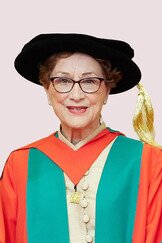

Professor Dame Carol Black built an outstanding medical career, as both clinician and scientist. The Centre she established at the Royal Free Hospital in London became internationally renowned for research and treatment of scleroderma (rare but frequently fatal) and other connective tissue diseases. She became President of the Royal College of Physicians of London in 2002 and Chair of the Academy of Medical Royal Colleges in 2006, raising the public profile of both institutions.
Around 2005, Dame Carol became increasingly interested in the social determinants of health, and policy on welfare and healthcare. As UK National Director for Health and Work from 2006 to 2011, and latterly an Expert Adviser to the government, she authored three influential independent reviews on workers’ health and wellbeing issues, pivotal to productivity and national policy. Galvanising widespread support from government, employers and others, she put across the core message that maintaining the health and wellbeing of employees throughout their working lives not only helps them and their families and the wider community, but also improves the economy, with increased productivity and reduced welfare costs.
A fourth major independent review for the UK Government, published in 2021 – on illicit drugs, their demand, supply, treatment, recovery and prevention – has led to a new 10-year anti-drug strategy, with allocation of unprecedented additional funding for addiction treatment and recovery, with remotivated workforce and collaborative working across government, hopefully leading to a safer society, with fewer homicides, reduction in serious acquisitive crime, and fewer drug-dependent people in prison.
Since 2015 Dame Carol has chaired the board of Think Ahead, a fast-track training programme for Mental Health Social Workers. In September 2018 she became chair of the British Library, which makes accessible to everyone the nation’s intellectual heritage, including economics, social science and science generally as well as the arts and humanities. Since June 2019 she has chaired the ‘What Works’ Centre for Ageing Better, commissioning research and working to support decision and policy-making to improve ageing people’s health, work, housing and community life.
Throughout her career, Dame Carol has striven to obtain proper evidence – on wider social and welfare issues as well as in the medical setting – enabling government policy and action to have a firmer basis in knowledge and science, emphasising the importance of high-quality evidence and evaluation.
In recognition of her contributions to academia and her distinguished leadership in the advancement of welfare and healthcare, the University has resolved to confer upon her the degree of Doctor of Social Sciences honoris causa.



